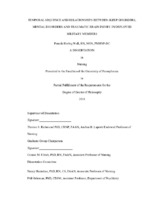Vitamin D clinical relevance in the recovery from traumatic brain injury among the military population
View File(s)
Visitor Statistics
Visits vs Downloads
Visitors - World Map
Top Visiting Countries
| Country | Visits |
|---|
Top Visiting Cities
| City | Visits |
|---|
Visits (last 6 months)
Downloads (last 6 months)
Popular Works for Colón, Yuisa Mariceli by View
| Title | Page Views |
|---|
Popular Works for Colón, Yuisa Mariceli by Download
| Title | Downloads |
|---|
View Citations
Citations
Background: Traumatic brain injury (TBI) still remains a difficult disorder to treat. TBI has been associated to chronic neuroinflammation and a high risk for neurodegenerative disorders. Since 2001 between ten to twenty percent of all deployed military members have suffered a combat-related TBI. Nearly twenty to thirty percent of those will experience chronic cognitive, behavioral and somatic symptoms after suffering a TBI.
Methods: The objective of this review is to evaluate current literature examining vitamin D as a neurosteroid with protective properties and its clinical relevance after traumatic brain injury. Vitamin D is known to participate in neurobiological processes and genomic regulation in the brain. Clinical and laboratory findings support that vitamin D modulates the immune responses to trauma, diminishes oxidative and toxic damage, and inhibiting activation and progression of the neuroinflammation. Inadequate levels of vitamin D have been identified as a common risk factor for many neurological disorders and have been linked to poorer recovery.
Results: This review found compelling evidence to support that the pathology of TBI is closely associated with neuroprotective mechanisms of vitamin D. Low vitamin D levels are common among US active duty military and veterans. The findings strongly suggest that optimizing vitamin D prior to injury could improve the recovery for military members after experiencing a TBI. Vitamin D ameliorates brain damage by modulating neuroinflammation, improving cell survival and down-regulating mechanisms involved in the progression of cell damage following a TBI. However, further studies are needed to evaluate the effects of vitamin D optimization in TBI outcomes.
This thesis has also been disseminated through the University of Central Florida STARS, https://stars.library.ucf.edu/honorstheses/97/. The author still retains copyright.
| Type | Thesis |
| Acquisition | Proxy-submission |
| Review Type | None: Degree-based Submission |
| Format | Text-based Document |
| Evidence Level | Literature Review |
| Research Approach | N/A |
| Keywords | Traumatic Brain Injury (TBI); Military Members; Vitamin D |
| Grantor | University of Central Florida |
| Advisor | Chase, Susan K. |
| Level | Bachelor's |
| Year | 2016 |
All rights reserved by the author(s) and/or publisher(s) listed in this item record unless relinquished in whole or part by a rights notation or a Creative Commons License present in this item record.
All permission requests should be directed accordingly and not to the Sigma Repository.
All submitting authors or publishers have affirmed that when using material in their work where they do not own copyright, they have obtained permission of the copyright holder prior to submission and the rights holder has been acknowledged as necessary.
Related items
Showing items related by title, author, creator and subjects.
-
Early outcomes from mild traumatic brain injury from child and proxy perspectives
Pieper, PamelaBackground. Approximately 70-90% of traumatic brain injuries are mild, with a worldwide incidence greater than 600 per 100,000 people. Previous studies of health-related quality of life (HRQoL) after a mild traumatic brain ... -
Temporal sequence and relationships between sleep disorders, mental disorders and traumatic brain injury in deployed military members
Wall, Pamela HerbigU.S. military members are often forward deployed to austere environments where they are exposed to environmental, mental, and physiological stressors that can negatively affect their wellbeing and readiness for service. ... -
A description of self-concept following traumatic brain injury
Lynch, Kathryn R.The purpose of the present study was to describe self-concept following a mild traumatic brain injury (TBI) at the expected endpoint of maximum recovery of function. According to the literature, this endpoint occurs between ... -
Developing an explanatory model for cognitive impairment in mild traumatic brain injury
Dasher, Gayle H.Nearly 2 million mild traumatic brain injuries occur annually and cognitive impairment is strongly associated with poor neurobehavioral performance. Identifying variables that influence the development of cognitive impairment ... -
Description of the moderate brain injured patient and predictors of discharge to rehabilitation
Rogers, SandraThis retrospective, descriptive study characterized moderate traumatic brain injured patients between the ages of 18 to 64 years that were treated at level I and level II trauma centers within the United States and the ...





